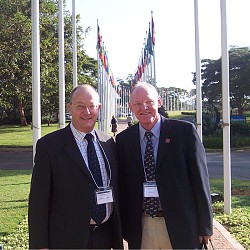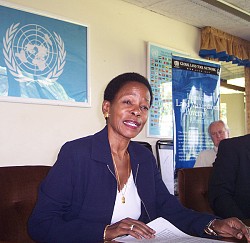Expert Group Meeting on Transparency in Land Administration
– a Capacity Building Programme for Africa
Nairobi, Kenya, 29-31 January 2007
|

FIG President Stig Enemark and Vice President Paul van der
Molen at United Nations Office in Gigiri, Nairobi.
|

Dr.
Anna Kajumulo Tibaijuka, UN Under-Secretary-General and
Executive Director, UN-HABITAT, addresses the participants of the Expert
group Meeting at the United Nations Office at Nairobi. |
FIG President Stig Enemark and Vice President Paul van der
Molen attended the Expert Group Meeting - EGM - on Transparency in Land
Administration – a Capacity Building Programme for Africa, held at the
UN-Habitat in Nairobi, Kenya, 29-31 January 2007. This meeting was organised
by UN-Habitat and the Global Land Tool Network (GLTN) in cooperation with
the International Institute for Geo-Information Science and Earth
Observation (ITC), Enschede, The Netherlands. The GLTN is facilitated by
UN-Habitat to promote the development of innovative tools, and to adopt a
more multidisciplinary approach to land also exemplifies an increased focus
on land and tenure security.
Transparency is a critical component of a functioning land
administration, in particular in view of the scarcity of clear and credible
information on land availability and transactions, and the poor
dissemination of public information on land rights and policies. The risk of
corruption and inequalities are very real in land allocation and management.
The consequences to the poor often takes the form of difficult access to
land assets, unawareness of land policies and legal frameworks, ignorance
about land transactions and prices, misallocation of land rights, land
grabbing and abuse. When in place, transparency can encourage civic
engagement and stakeholders’ accountability by rendering the public decision
making arena more accessible. This in turn strengthens confidence in
governments and public agencies, and has a positive economic impact.
The EGM, brought together approximately 35 participants from Sub-Saharan
Africa and internationally identifying issues and priorities for exploring
the land administration-transparency area and a road map for the way
forward. The participants represent experiences from land, governance and
training and capacity building, drawing from international academic and
professional expertise while focusing specifically on the realities in
Sub-Saharan Africa. President Enemark and Vice President van der Molen were
invited to present their view on transparency subject in relation to
capacity building. They participated in a workshop developing the basis for
a capacity programme.
From capacity building perspective it was concluded that there is a need
for unconventional approaches and for changes of mindset. We are taking
rules as ‘given’ rather than thinking differently how to reflect on land.
Two issues are relevant: curricula to be updated in all land related
professions; and: training of trainers (including retraining lecturers):
Knowledge can be ‘taught’ and Skills can be trained. For attitudes a
positive environment is needed to create confidence and where there is room
for reflection on behaviour and support to sustain new behaviour. Short
training will provide awareness, guidance and encouragement. To increase
impact of training we need people to be ready to implement outcomes. People
need to work on specific cases where they can directly implement and discuss
with others in a mutual support network. This will need a workshop/training
combination based on own needs.
It is needed to address lack of transparency systematically. E.g. when do
land administrators get corrupted? We watch one set of corrupt practices be
replaced by another and this ‘cascades up’. There is usually evidence to
prosecute, but other social/cultural conditions apply in Africa. Because of
embedded understandings of corruption we need to re-orient all role-players
and cascade down. Lack of transparency is not restricted to Africa.
The next phase will be the joint execution of courses, together with
regional training and capacity building institutions, targeted mainly
towards policy makers, during 2007 and 2008.
Read more:
Chrit Lemmen
Vice Chair of FIG Commission 7 and chair of Working Group 7.1
E-mail: [email protected]
|
























